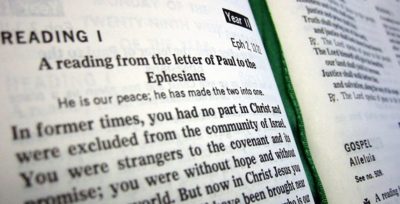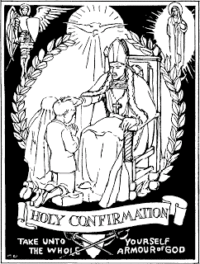Propers for The Twelfth Sunday after Trinity

Propers for The Twelfth Sunday after Trinity
The Collect: ALMIGHTY and everlasting God, who art always more ready to hear than we to pray, and art wont to give more than either we desire or deserve; Pour down upon us the abundance of thy mercy; forgiving us those things whereof our conscience is afraid, and giving us those good things which we are not worthy to ask, but through the merits and mediation of Jesus Christ, thy Son, our Lord. Amen.
The Epistle: 2 Corinthians iii. 4. SUCH trust have we through Christ to God-ward: not that we are sufficient of ourselves to think any thing as of ourselves; but our sufficiency is of God; who also hath made us able ministers of the new testament; not of the letter, but of the spirit: for the letter killeth, but the spirit giveth life. But if the ministration of death, written and engraven in stones, was glorious, so that the children of Israel could not stedfastly behold the face of Moses for the glory of his countenance; which glory was to be done away: how shall not the ministration of the spirit be rather glorious? For if the ministration of condemnation be glory, much more doth the ministration of righteousness exceed in glory.
The Gospel: St. Mark vii. 31. JESUS, departing from the coasts of Tyre and Sidon, came unto the sea of Galilee, through the midst of the coasts of Decapolis. And they bring unto him one that was deaf, and had an impediment in his speech; and they beseech him to put his hand upon him. And he took him aside from the multitude, and put his fingers into his ears, and he spit, and touched his tongue; and looking up to heaven, he sighed, and saith unto him, Ephphatha, that is, Be opened. And straightway his ears were opened, and the string of his tongue was loosed, and he spake plain. And he charged them that they should tell no man: but the more he charged them, so much the more a great deal they published it; and were beyond measure astonished, saying, He hath done all things well: he maketh both the deaf to hear, and the dumb to speak.
Some thoughts on the contents…
Matthew Henry: Commentary on Mark 7; some thoughts
…to teach us to avoid every thing that savours of ostentation. Let us learn of Christ to be humble, and to do good where no eye sees, but his that is all eye.
He spit upon his own finger, and then touched his tongue, as if he would moisten his mouth, and so loosen that with which his tongue was tied; these were no causes that could in the least contribute to his cure, but only signs of the exerting of that power which Christ had in himself to cure him, for the encouraging of his faith, and theirs that brought him. The application was all from himself, it was his own fingers that he put into his ears, and his own spittle that he put upon his tongue; for he alone heals.
He looked up to heaven, to give his Father the praise of what he did; for he sought his praise, and did his will, and, as Mediator, acted in dependence on him, and with an eye to him. Thus he signified that it was by a divine power, a power her had as the Lord from heaven, and brought with him thence, that he did this; for the hearing ear and the seeing eye the Lord has made, and can remake even both of them. He also hereby directed his patient who could see, though he could not hear, to look up to heaven for relief.
And he took him aside from the multitude–As in another case He “took the blind man by the hand and led him out of the town” ( Mar 8:23 ), probably to fix his undistracted attention on Himself, and, by means of certain actions He was about to do, to awaken and direct his attention to the proper source of relief.
and put his fingers into his ears–As his indistinct articulation arose from his deafness, our Lord addresses Himself to this first. To the impotent man He said, “Wilt thou be made whole?” to the blind men, “What will ye that I shall do unto you?” and “Believe ye that I am able to do this?” ( Jhn 5:6 Mat 20:32 9:28 ). But as this patient could hear nothing, our Lord substitutes symbolical actions upon each of the organs affected.
and he spit and touched his tongue–moistening the man’s parched tongue with saliva from His own mouth, as if to lubricate the organ or facilitate its free motion; thus indicating the source of the healing virtue to be His own person. (For similar actions, see Mar 8:23 Jhn 9:6 ).
—–
Jamieson, Fausset & Brown: Commentary on Mark 7; some thoughts…
And looking up to heaven–ever acknowledging His Father, even while the healing was seen to flow from Himself (see on JF & B for Joh 5:19).
And straightway his ears were opened—
and the string of his tongue was loosed, and he spake plain–The cure was thus alike instantaneous and perfect.
but the more he charged them, so much the more a great deal they published it–They could not be restrained; nay, the prohibition seemed only to whet their determination to publish His fame.
And they were beyond measure astonished, saying, He hath done all things well–reminding us, says TRENCH, Of the words of the first creation ( Gen 1:31, Septuagint), upon which we are thus not unsuitably thrown back, for Christ’s work is in the truest sense “a new creation,”






